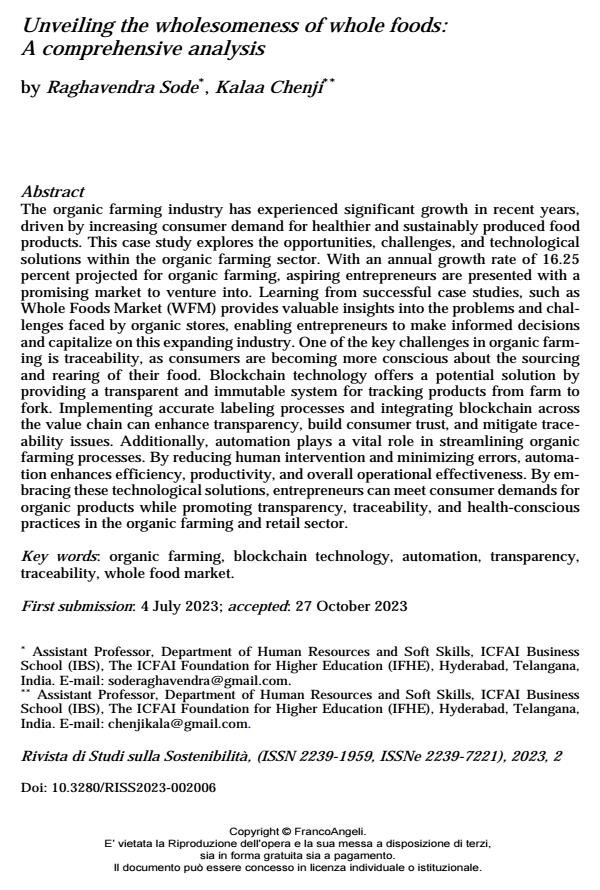Unveiling the wholesomeness of whole foods: A comprehensive analysis
Titolo Rivista RIVISTA DI STUDI SULLA SOSTENIBILITA'
Autori/Curatori Raghavendra Sode, Kalaa Chenji
Anno di pubblicazione 2024 Fascicolo 2023/2
Lingua Inglese Numero pagine 17 P. 89-105 Dimensione file 64 KB
DOI 10.3280/RISS2023-002006
Il DOI è il codice a barre della proprietà intellettuale: per saperne di più
clicca qui
Qui sotto puoi vedere in anteprima la prima pagina di questo articolo.
Se questo articolo ti interessa, lo puoi acquistare (e scaricare in formato pdf) seguendo le facili indicazioni per acquistare il download credit. Acquista Download Credits per scaricare questo Articolo in formato PDF

FrancoAngeli è membro della Publishers International Linking Association, Inc (PILA), associazione indipendente e non profit per facilitare (attraverso i servizi tecnologici implementati da CrossRef.org) l’accesso degli studiosi ai contenuti digitali nelle pubblicazioni professionali e scientifiche.
The organic farming industry has experienced significant growth in recent years, driven by increasing consumer demand for healthier and sustainably produced food products. This case study explores the opportunities, challenges, and technological solutions within the organic farming sector. With an annual growth rate of 16.25 percent projected for organic farming, aspiring entrepreneurs are presented with a promising market to venture into. Learning from successful case studies, such as Whole Foods Market (WFM) provides valuable insights into the problems and challenges faced by organic stores, enabling entrepreneurs to make informed decisions and capitalize on this expanding industry. One of the key challenges in organic farming is traceability, as consumers are becoming more conscious about the sourcing and rearing of their food. Blockchain technology offers a potential solution by providing a transparent and immutable system for tracking products from farm to fork. Implementing accurate labeling processes and integrating blockchain across the value chain can enhance transparency, build consumer trust, and mitigate traceability issues. Additionally, automation plays a vital role in streamlining organic farming processes. By reducing human intervention and minimizing errors, automation enhances efficiency, productivity, and overall operational effectiveness. By embracing these technological solutions, entrepreneurs can meet consumer demands for organic products while promoting transparency, traceability, and health-conscious practices in the organic farming and retail sector.
Parole chiave:organic farming, blockchain technology, automation, transparency, traceability, whole food market.
Raghavendra Sode, Kalaa Chenji, Unveiling the wholesomeness of whole foods: A comprehensive analysis in "RIVISTA DI STUDI SULLA SOSTENIBILITA'" 2/2023, pp 89-105, DOI: 10.3280/RISS2023-002006